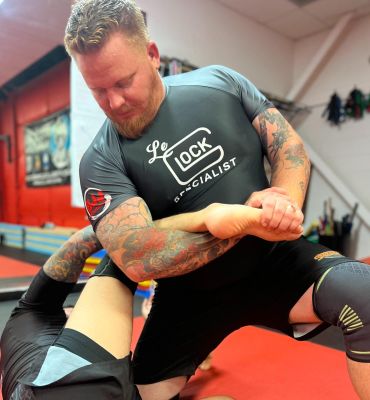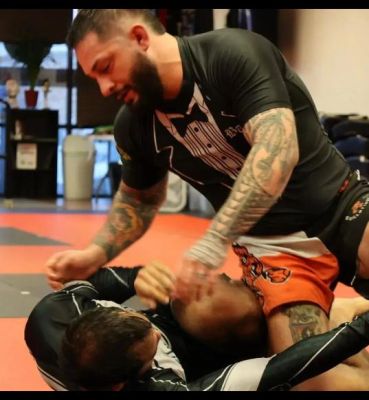
Welcome to Black Tie Brazilian Jiu Jitsu!!!
Welcome to Black Tie Brazilian Jiu Jitsu - Colorado! As a trusted source for Brazilian Jiu Jitsu classes in Centennial, CO, our mission is to teach kids and adults the joy of martial arts. When we open our doors each day, we teach our students the basics of Brazilian Jiu Jitsu in a safe, controlled environment. Our caring teachers do everything in their power to ensure all our students can have fun, get fit, and enjoy a new hobby! Contact us today to get started. We look forward to hearing from you!
- FAQ -
Getting Started in Brazilian Jiu Jitsu
1. What is Brazilian Jiu Jitsu?
Brazilian Jiu Jitsu is a martial art and combat sport that focuses on ground fighting and grappling techniques. It emphasizes leverage, technique, and body positioning to overcome opponents, making it suitable for practitioners of all sizes and genders.
2. Do I need any prior experience in martial arts or fitness to start BJJ?
No prior experience is required to start Brazilian Jiu Jitsu. BJJ is suitable for beginners with varying fitness levels. As a beginner, you'll learn the fundamentals and gradually progress at your own pace.
3. What should I wear to my first BJJ class?
For your first BJJ class, it's best to wear comfortable athletic attire such as a t-shirt and shorts or leggings. We will provide loaner gi (uniform) for beginners who decide to train on our Gi classes, but we encourage everyone to purchase their own gi eventually.
4. How often should I train BJJ?
Training frequency depends on your schedule and personal goals. Consistency is key to progress in BJJ. Starting with 2-3 training sessions per week is a good foundation. As you advance, you may choose to increase your training frequency.
5. Is BJJ suitable for self-defense?
Yes, Brazilian Jiu Jitsu is highly effective for self-defense. It teaches you how to control and neutralize opponents, even if they are bigger or stronger. BJJ emphasizes leverage and technique over brute force, making it a practical self-defense system.
6. Is BJJ safe?
Like any physical activity, there is a risk of injury in Brazilian Jiu Jitsu. However, BJJ is generally considered safe when practiced in a controlled and supervised environment. Qualified instructors prioritize safety and teach proper technique to minimize the risk of injuries.
7. Will I get injured in BJJ?
While injuries can occur in any sport, the risk of injury in BJJ can be reduced by practicing with a focus on proper technique, controlled sparring (rolling), and respecting the limits of yourself and your training partners. It's important to listen to your body, communicate with your training partners, and tap out (submit) when necessary
8. How long does it take to progress and earn belts in BJJ?
The progression and belt system in BJJ varies from gym to gym. On average, it takes several years of consistent training to progress through the ranks and earn belts. The journey is individual, and the focus should be on personal growth rather than solely on belt promotions.
9. Will I be training with people of different skill levels?
Yes, training with individuals of different skill levels is an essential aspect of BJJ. It provides opportunities to learn from more experienced practitioners and to help beginners progress. The training environment is here is supportive and focused on personal improvement.
10. Can I train BJJ if I'm not in top physical shape?
Absolutely! BJJ is for everyone, regardless of their fitness level. BJJ training itself will help improve your physical fitness over time. It's important to start at your own pace and gradually build endurance, strength, and flexibility.
11. Is there a minimum age requirement to start BJJ?
Black Tie Jiu Jitsu offers BJJ classes for children as young as 3 years old.
____________________________________________________________________________________________________
Sam Harris - The Pleasure of Drowning (No-Gi Highlight Video)
Schedule
Kid's Brazilian Jiu Jitsu (Gi)
7 - 7:45pmKid's Brazilian Jiu Jitsu (Gi)
Kid's Brazilian Jiu Jitsu (No Gi)
7 - 7:45pmKid's Brazilian Jiu Jitsu (No Gi)
Adult Brazilian Jiu Jitsu (No-Gi)
6 - 7amAdult Brazilian Jiu Jitsu (No-Gi)
Kid's Brazilian Jiu Jitsu (Gi)
5:40 - 6:20pmKid's Brazilian Jiu Jitsu (Gi)
Instructors
-
 Will Holzapfel
Will Holzapfel
- Black Belt
-
 Zach Medina
Zach Medina
- Brown Belt
-
 Nesta Hayward (Inactive)
Nesta Hayward (Inactive)
- Purple Belt - 2 Stripes
-
Jose Pedro
- Purple Belt
